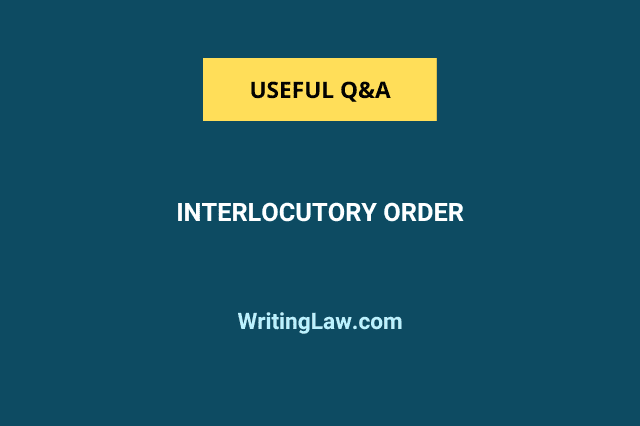
An order passed during the proceedings of the case and which is of urgent requirement is known as an interlocutory order. Whenever it appears to the court to be just (morally right and fair) and convenient, it may pass an interlocutory order before finally disposing of the case.
The ultimate aim of passing an interlocutory order is to assist the parties to the suit and to protect the subject matter from getting destroyed or lost.
Interim Orders
Interim orders are the orders which a court passes during the pendency of a suit or proceeding. Such orders do not determine the substantive rights and liabilities of the parties with regard to the subject matter of the suit or proceeding.
In the Code of Civil Procedure of 1908, such interim orders may be summarised as follows:
- Payment in court under Order 24
- Security for costs under Order 25
- Commissions under Order 26
- Arrest before judgement under Order 38
- Attachment before judgement under Order 38
- Temporary injunctions under Order 39
- Interlocutory orders under Order 39
- Appointment of receiver under Order 40
In this law post, you will read about interlocutory orders provided under Order 39 from Rule 6 to Rule 10 of the Civil Procedure Code (CPC).
Interlocutory Order or Interim Order
The word “interlocutory” means not final or definitive or that which only settles some intervening matter relating to the cause.
In simple terms, a decree or judgement given provisionally (which may or may not be related to the actual issue which is raised and is to be decided primarily) during the course of a legal action is an interlocutory order. Thus, whenever a court is satisfied that there is an urgent need to decide a matter, the court can make an interlocutory order.
Order 39 Rule 6 of the Code of Civil Procedure deals with the court’s power to order interim sale. It states that the court can order for the sale of such movable property which is subject to speedy and natural decay (perishable goods) on the application of parties or for any other justified reasons.
Interlocutory Order in Specific Subject-Matter
Under Rule 7 of Order 39, a court can also order for detention, preservation, or inspection of any property which is the subject matter of such a suit or as to which any question may arise. For this purpose, the court can:
- Allow any person to enter any land or building,
- Authorises any sample or to observe or to try experiments to obtain full information.
Prior Notice Before Passing Interlocutory Order
The court must give notice to the opposite party before making any interlocutory order. If a delay occurs in imparting justice to the party by serving a prior notice, then the interlocutory order can still be passed without serving the notice.
The court can also make the interlocutory order in the following matters:
- Where the subject matter of a suit is money, or
- Some other thing capable of delivery, and a party to a suit admits that he holds such money or thing as a trustee for another party.
In the above two cases, the court can make the interlocutory order and order to deposit the money or the thing (capable of delivery) into the custody of the court.
Read Next: 13 Types of Court Orders Under CPC
- What Is Anticipatory Breach of Contract Under Contract Act? - 13th July 2024
- Who May File Written Statement (With Its Time Limit and Rules) - 31st May 2024
- Who Is a Legal Representative? - 30th May 2024







